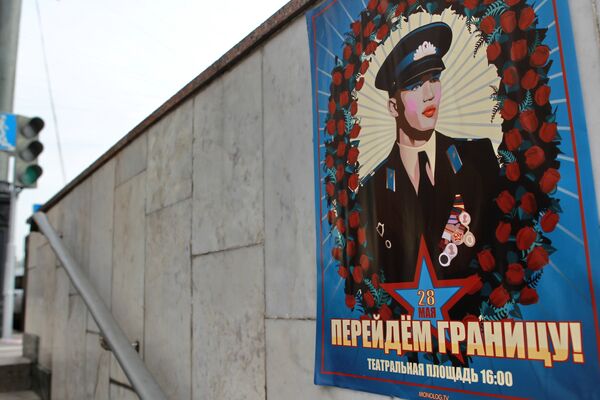Russian human rights and gay activists hit out on Monday at a law banning the promotion of homosexuality that has already entered into force in the country’s second city of St. Petersburg and could soon be approved nationwide.
“The authorities are attempting to legalize homophobia,” said leading gay activist Valery Sozaev at a downtown Moscow news conference. “Some 5-7 percent of the population – several million people – are being discriminated against.”
Sozayev also said that according figures collected by activists, “over 50 percent” of the gay, lesbian and transgender community had experienced hostility, including discrimination at work and physical attacks, but that only around a fifth of these incidents were reported to the authorities.
Homosexuality was only decriminalized in Russia in 1993, and anti-gay sentiments, including among officials, remain strong. In 2010, former Moscow Mayor Yury Luzhkov described attempts to hold a Gay Parade in the capital as “Satanic.” There has never been a Gay Parade in Russia.
According to a 2010 survey by Russia’s independent Levada Center polling agency, 74 percent of respondents said gays and lesbians were "amoral" and "mentally defective," while only 45 percent said they should enjoy the same rights as heterosexuals.
The law adopted in St. Petersburg makes it illegal to “disseminate homosexual propaganda” or suggest to minors that homosexual relations are normal. The bill, which was passed by the St. Petersburg city parliament last month, stipulates fines of up to 5,000 rubles ($170) for individuals, 50,000 rubles for officials and up to 500,000 rubles for organizations that violate it. It was announced last week that Russia’s federal parliament, the State Duma, is to consider a similar bill, drafted by Siberian legislators. The law, which has the backing of Russia’s powerful Orthodox Church has also already been adopted in one form or another three regions across Russia.
The initiator of the law in St. Petersburg, United Russia city parliament deputy Vitaly Milonov, justified his bill in an explanatory document that cited the findings of “specialists who believe the propaganda of sexual deviance has a destructive effect on, above all, minors, and is also one of the reasons preventing a rise in birthrates.”
But activists expressed concern on Monday that the law could be use to crack down on doctors who provide advice on sexual health to gay young people, groups who provide support about coming out and even “men kissing men or women kissing women” in public. They also said it was likely to encourage homophobic violence.
Pop singer Madonna could also fall foul of the law when she performs in St Petersburg in August if she goes ahead with a pledge to speak out against it in support of the gay and lesbian community.
“This law is very vulnerable to abuse,” said Vladimir Gefter, a member of the Kremlin council of human rights. “Today they can discriminate against one group, tomorrow another.”
He also mocked the wording of the law, including its use of the “Soviet-era term propaganda.”
"How can you punish the propaganda of something which is not punishable by law?” he asked. “And how do you define propaganda?”
Gefter also slammed the apparent equaling of homosexuality with pedophilia, the promotion of which is also forbidden in the law.
“It’s clear the promotion of pedophilia is a great deal more dangerous than the promotion of homosexuality,” he said.
Russia's human rights ombudsman, Vladimir Lukin, called the law "strange" and said it "created conditions for the arbitrary rule of law toward adults” in a report published in the Rossiskaya Gazeta government newspaper last month.
Activists also suggested the law had been drawn up to increase support for President-elect Vladimir Putin’s United Russia party ahead of recent parliamentary elections, at which the party just managed to maintain its majority.
“Homophobic deputies from the party of swindlers and thieves felt unsure of themselves before local and State Duma elections and decided to use the wildest myths to make scapegoats out of the gay, lesbian and transgender community,” said gay activist Igor Yasin, referring to United Russia’s popular, unofficial nickname.
Gay activists also pledged to hold a week of protests against the law, including in St. Petersburg.




